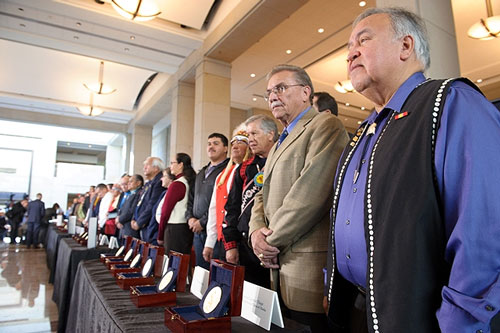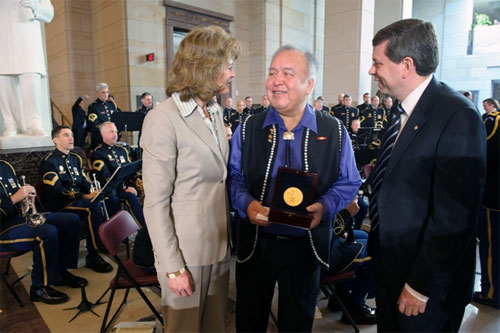
Congress Honors Tlingit Code Talkers, Forgotten Heroes of Both World Wars
November 25, 2013
Years overdue, Congressional Gold Medals honoring the unrecognized code talkers who used their native languages to transmit secret messages in both World Wars were presented a decade after the Navajo Code Talkers were honored with the same distinction.
Commander William “Ozzie” Sheakley represented the Central Council of Tlingit and Haida Indian Tribes of Alaska at Wednesday’s Congressional Gold Medal Ceremony Honoring Native American Code Talkers
The five Tlingit men, all deceased, who were honored with silver medals are Robert Jeff David Sr (Haines), Richard Bean Sr., George Lewis, and brothers Harvey Jacobs and Mark Jacobs Sr. (Sitka & Angoon). The Tlingit and Haida tribes were represented at the ceremony hosted in the United States Capitol by three Alaskans; Commander William “Ozzie” Sheakley, William Thomas Jr., and Jeff David Jr. – a Tlingit code talker descendant. In addition to the 33 gold medals presented to tribes around the nation Wednesday, more than 200 silver medals were presented to the code talkers and their families. “The critical role these men played in sparing the lives of fellow servicemen is remarkable,” said Representative Don Young (R-AK). “By communicating in spoken code at places like Iwo Jima and Normandy, these fine men forever changed history. Because of them, we were able to relay real-time information on enemy positions, provide directions to troops on the ground, and gather intelligence that helped us end a dark time in the world’s history.” “These Tlingit soldiers bravely passed along our nation’s secrets at a very difficult time, but their story should not be a secret to Americans today,” said Senator Lisa Murkowski (R-AK). “Alaska’s World War II history is far too often an untold and unappreciated part of our nation’s history. Our territory was occupied in the Aleutians, our first people represented the Alaska Territorial Guard and our Code Talkers stepped forward with a willingness to defend a nation they had yet to fully belong to. I thank them and their people for their courage and commitment,” said Murkowski.
Commander William “Ozzie” Sheakley representing the Central Council of Tlingit and Haida Indian Tribes of Alaska is pictured with Senators Lisa Murkowski and Mark Begich.
Code Talkers were first utilized in World War I, when standard methods of communications had become decoded by enemy intelligence. Native American Code Talkers used their native tongue to communicate real-time wartime messages with great accuracy and speed, at a time when secret messages otherwise would have taken up to a half-hour to decipher their information. The first known use of Native Americans in the American military to transmit messages under fire was a group of Cherokee troops utilized by the American 30th Infantry Division serving alongside the British during the Second Battle of the Somme during World War I. According to the Division Signal Officer, this took place in September 1918. Their unit was under British command at the time. This top-secret communications method continued extensively throughout World War II in both the European and Pacific theaters. But these instrumental soldiers, who laid the groundwork for wartime communications, returned home not as praised heroes but rather sworn to secrecy. The Code Talker program remained classified until 1968. The Navaho Code Talkers utilized during WWII were the first to receive recognition after the declassification of the operation in 1968. In 1982, these code talkers were given a Certificate of Recognition by U.S. President Ronald Reagan, who also named August 14, 1982 "Navajo Code Talkers Day". The Code Talkers Recognition Act of 2008 (H.R. 4544), would later honored the previously unrecognized tribal groups and veterans. Senators Lisa Murkowski and Congressman Don Young were both cosponsors of the 2008 legislation, and on November 15, 2008, The Code Talkers Recognition Act of 2008, was signed into law by President George W. Bush, which recognized every Native American code talker who served in the United States military during WWI or WWII (with the exception of the already-awarded Navajo a decade earlier) with a Congressional Gold Medal of individual design for his tribe (to be retained by the Smithsonian Institution), and a silver medal duplicate to each code talker. The public ceremony last Wednesday could be the final chapter after years of effort in recognizing the contribution of all the Native American code talkers. They made a difference," House Speaker John Boehner (R-Ohio) declared as he began a series of speeches by congressional leaders and other lawmakers in the U.S. Capitol's Emancipation Hall. Putting the code talkers' contributions to the U.S. war effort in dramatic terms, the code talkers saved lives, and they won battles said Rep. Tom Cole (R-OK). Senate Minority Leader Mitch McConnell (R-Ky.) said rarely has one group been so crucial to a nation's military success. Yet, McConnell said, so little was known for so long about their service. About a decade ago, Navajo code talkers were honored. "Today, we honor the rest of the code talkers, whose extraordinary skill and heroism will be remembered as long as the history of modern warfare is told," McConnell said. The Marines recruited 200 Navajos in WWII who served in the Pacific theater. The first 29 Navajo recruits attended boot camp in May 1942. This first group then created the Navajo code at Camp Pendleton, California. Senate Majority Leader Harry Reid (D-Nev.) put their service in historical perspective by recalling the treatment tribal members often endured. At one time, Reid recalled, tribal members were barred from using their native languages and were not considered legal landowners because they could not speak English. When war came, those tribal members were called upon to use those same languages to help defeat the enemy, languages so obscure they were viewed as a "perfect secret weapon." After the official ceremony, survivors of the code talkers and others received medals at the National Museum of the American Indian. The Central Council of the Tlingit and Haida Indian Tribes of Alaska (Central Council) is a tribal government representing more than 28,000 Tlingit and Haida Indians worldwide. Central Council is a sovereign entity and has a government to government relationship with the United States.
E-mail your news &
photos to editor@sitnews.us
|
||

